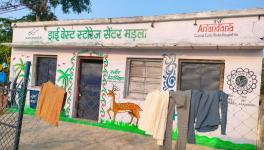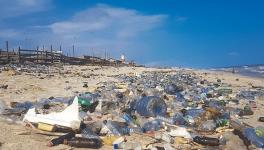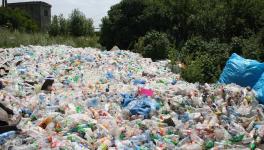Ban on Single-Use Plastics May Face Enforcement Challenges
India is going to ban certain specified Single-Use Plastics (SUP) from July 1. The Ministry of Environment, Forest and Climate Change notified the Plastic Waste Management Amendment Rules, 2021, on August 12 last year to this effect. In the notification, SUP commodities were defined as “Plastic items intended to be used once for the same purpose before being disposed of or recycled”.
The country will ban the manufacture, import, stocking, distribution, sale and use of identified single-use plastic items, which have low utility and high littering potential, all across the country. The objective behind the move is said to be to mitigate the adverse impacts of littered single-use plastic items plastic on both terrestrial and aquatic ecosystems, including in marine environments, which are globally recognised.
The list of 21 banned items includes - earbuds with plastic sticks, plastic sticks for balloons, plastic flags, candy sticks, ice-cream sticks, polystyrene (thermocol) for decoration, plastic plates, cups, glasses, cutlery such as forks, spoons, knives, straw, trays, wrapping or packing films around sweet boxes, invitation cards, cigarette packets, plastic or PVC banners less than 100-micron stirrers.
One of these items facing stiff resistance from related powerful FMCG industries is plastic straws. They are demanding an extension of six-12 months on the ban. However, their demand is being rebuffed by environmentalists who say that the plastic straw-based industries did not utilise the extension of six months already given to them, with the deadline moved from January 1 to July 1, 2022. Seeking another extension is just a ploy to dilute the ban on plastic straws.
Another valid objection raised is that the list of banned items is not comprehensive, as the list does not include Multi-Layered Packaging (MLP). MLP is used in almost all fast-moving consumer goods, from chips to shampoos to gutka pouches.
Sunita Narain, director general, Centre for Science and Environment (CSE), Narain said, "This is the real menace when it comes to plastic contamination because these items are almost impossible to collect and absolutely impossible to process. The only thing that can be done with this packaging material is to send it to cement plants for incineration.”
The Plastic Waste Management Amendment Rules, 2021 also prohibit the manufacture, import, stocking, distribution, sale, and use of plastic carry bags having a thickness less than seventy-five microns with effect from September 30, 2021, and having a thickness less than a thickness of 120 microns with effect from December 31, 2022.
The Ministry also framed guidelines on Extended Producers Responsibility on plastic packaging as Plastic Waste Management Amendment Rules, 2022 on February 16 this year. Extended Producer Responsibility is the responsibility of a producer for the environmentally sound management of the product until the end of its life.
The catch here is that the onus to recycle or reprocess the collected SUP material by 2024 has been put on plastic producers/industries. However, no clarification has been given as to what will be done to the plastic waste, which can neither be recycled nor reprocessed.
As many as 25 states and Union Territories have already banned SUP, as per the latest report of the Central Pollution Control Board. Gurdeep Singh Batra, president of the Plastic Manufacturers and Trader Association in Punjab, told NewsClick, “Industries need a uniform central government notification across the country to avoid any confusion or obstacles in the implementation of the ban. We know that the single-use plastic ban process has been enforced for the last five years in some parts of the country, and each state notified their own rules and bans specific plastic items putting industries into a tizzy and left at the mercy of concerned departments including pollution control, district administration, the municipal corporation and the police."
Sunita Narain recommended the way to deal with the discarded SUP, saying, “For this, we need a three-pronged strategy. Firstly, all the plastic produced and used should be collected for disposal. Secondly, the waste plastic must be recycled or incinerated; it should not reach landfills or choke our water bodies. Thirdly, the reuse or disposal has to be in a manner that is environmentally friendly and does not end up creating more pollution or health hazards. But most importantly, those plastic items that are difficult to collect or recycle should be eliminated from use. This is where the current ban, however limited, fits in.”
Get the latest reports & analysis with people's perspective on Protests, movements & deep analytical videos, discussions of the current affairs in your Telegram app. Subscribe to NewsClick's Telegram channel & get Real-Time updates on stories, as they get published on our website.
























